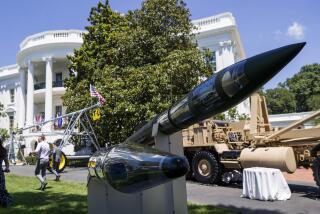Missouri Ordered to Persian Gulf : Battleship, 3 Escorts to Add Substantial U.S. Firepower
- Share via
WASHINGTON — The Pentagon, in a major increase of U.S. firepower in the troubled Persian Gulf, has ordered the Navy to dispatch the battleship Missouri and three escort ships to the region next month, officials said Friday.
The recently refurbished World War II-era battleship, which will join the aircraft carrier Constellation in the region, will not accompany the 11 Kuwaiti oil tankers that will be reregistered to fly the American flag and escorted by other U.S. ships.
But the Missouri’s Tomahawk missile system could strike targets in Iran if that country should use the Silkworm anti-ship missiles that it is expected to base along its shoreline in the Persian Gulf at the Strait of Hormuz, said the defense officials, who asked not to be identified. The battleship will patrol the Gulf of Oman outside the strait, which connects the two gulfs.
Approved by Joint Chiefs
The strategy to significantly increase U.S. military presence in the region by sending a battleship group was first disclosed in a Pentagon report to Congress last week. The strategy was approved this week by the Joint Chiefs of Staff, and Pentagon sources on Friday provided new details of the Navy escort plan.
“We owe it to the servicemen who would be sent to the Persian Gulf that they have the absolute best protection,” said Sen. Pete Wilson (R-Calif.), a member of the Senate Armed Services Committee. “The battleship is ideally suited for this mission. It’s hard to hurt, and it has a lot of muscle.”
The escort policy is designed to underscore the U.S. commitment to keeping open international sea lanes used to carry oil from the petroleum-rich region. But fears about the risk to U.S. servicemen in the volatile gulf, where Iran and Iraq have been at war for 6 1/2 years, mushroomed after the Navy frigate Stark was crippled by two Iraqi missiles last month.
A ‘One-Two Punch’
Under the plan outlined by Pentagon officials, the Constellation and the Missouri will form a “one-two punch” should Iran fire upon U.S. ships escorting the Kuwaiti tankers. The presence of both battle groups will give the commander of the Navy’s 6th Fleet based in the Mediterranean the flexibility to deploy both ships or just the Missouri in the Arabian Sea.
The Missouri is scheduled to leave its home port in Long Beach sometime in late July and to arrive by late August, bringing the U.S. naval presence immediately outside the gulf to an estimated 15 ships.
The battleship’s thick armor plating makes it nearly impenetrable to missiles, and its enormous 16-inch guns can fire a shell the weight of a small car a distance of 25 miles.
The Missouri had been scheduled to stay in Long Beach for several months, undergoing minor repairs and routine maintenance after a recent around-the-world tour. Because the Missouri performed without any major problems, its crew will have the ship in top shape by next month, a Navy spokesman said.
Anti-Missile System
The three ships that will escort the Missouri were not identified, though it is believed that they will come from the ports of Long Beach and San Diego. The battle group is expected to include a $1-billion Aegis cruiser, which has a sophisticated radar battle management system that can detect missiles and shoot them down. The system permits the battleship group to protect itself without relying on carrier-based fighter planes for assistance.
However, at least during the initial escort operations, Pentagon officials said, F-14 fighter jets from the Constellation will lend air support for the Kuwaiti tankers as they pass through the Strait of Hormuz. The carrier and its screen of escorts, a formation too large to maneuver in the Persian Gulf, will leave the area to make periodic port calls.
The six U.S. warships now in the gulf soon will be replaced with eight destroyers, cruisers and frigates, the State Department said. Three of the ships--the guided-missile destroyer Kidd and the guided-missile frigates Flatley and Klakring--passed through the Suez Canal on Wednesday en route to the gulf.
No date has been set for the first escort operation, but the eight warships will be in the area and ready by July 1, a senior aide to the Democratic congressional leadership said.
Times staff writer David Lauter contributed to this article.
More to Read
Sign up for Essential California
The most important California stories and recommendations in your inbox every morning.
You may occasionally receive promotional content from the Los Angeles Times.













